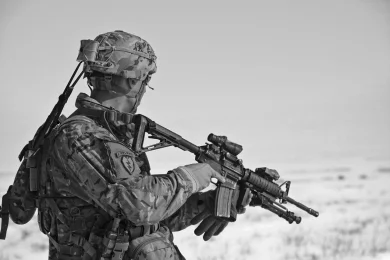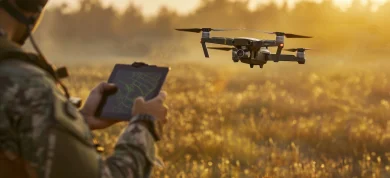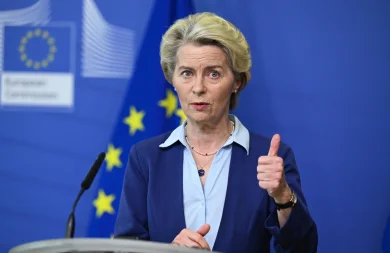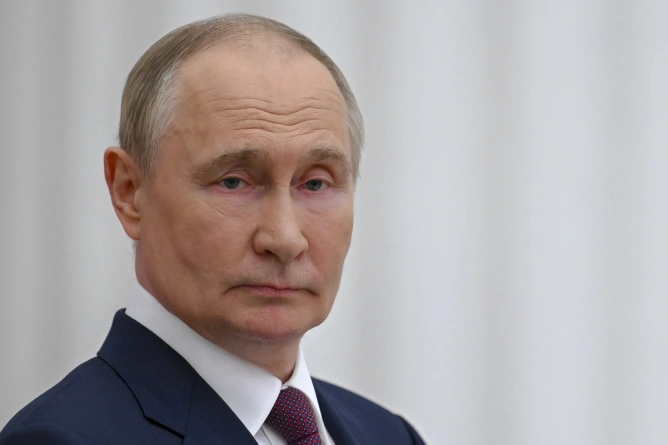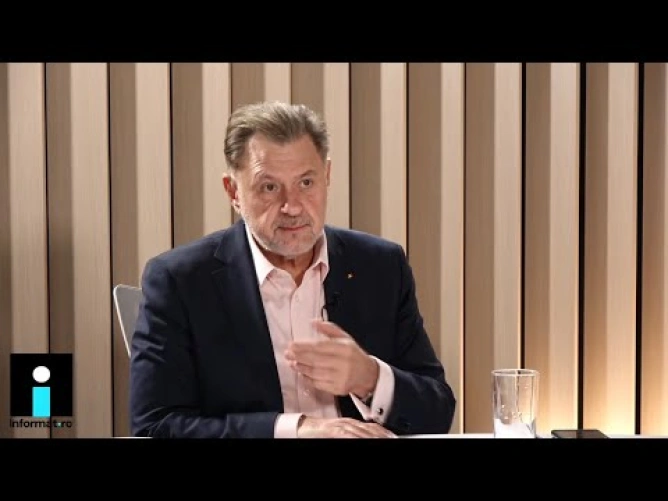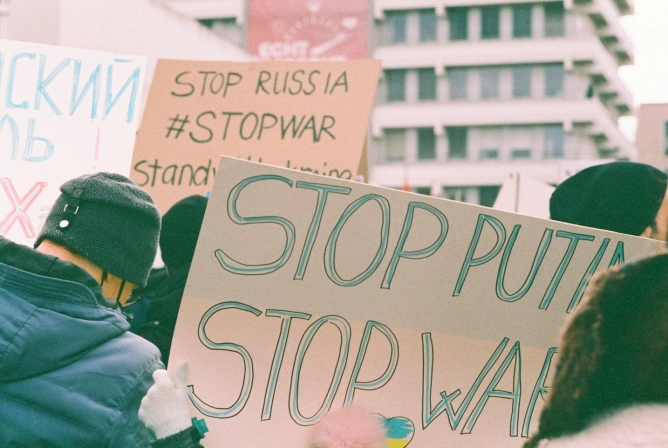
How would NATO react if, one morning, Russian forces occupied a small town in Estonia, invoking the protection of "Russian-speaking compatriots"? Would this be an invasion or just a provocation? And would the Alliance be willing to risk a total war for Narva, a town of 50,000 inhabitants on the border with Russia? This is the uncomfortable question raised by Carlo Masala, a professor of international politics at the Bundeswehr University in Munich, in his dialogue with the BBC for The Global Story.
In a sharp tone, Masala warns that Europe is in "the most dangerous period since World War II, even more tense than the Cuban missile crisis." In his opinion, Russia is not satisfied with Ukraine but is preparing "a political test" to check whether Article 5 still has practical value. According to the information he cites, Moscow is expanding its army to 1.5 million soldiers and producing "about 600 ballistic and cruise missiles" annually, at a pace that exceeds the needs of the Ukrainian front. At the same time, a hybrid war is already taking place on European territory: cyberattacks, fires at arms factories, drones, and balloons in the airspace of the Baltic countries — "measures meant to sow panic and distrust in democratic governments."
For Masala, the conclusion is clear: "If a member state is attacked and NATO does not intervene, then the Alliance is dead. For Russia, this would be the ultimate victory — not a military conquest, but a political one." Carlo Masala starts from the idea that Russia does not need a total invasion to undermine European security. In his view, the greatest risk for NATO is not a conventional war, but a "political test" designed to challenge the solidarity among member states. A limited action, such as occupying an Estonian town with a Russian-speaking population, would force the Alliance to decide whether to invoke Article 5 and risk a direct confrontation with a nuclear power. Essentially, Masala warns, the stakes are not about conquering territories, but about credibility: if NATO hesitates, it loses authority and legitimacy, while Russia wins the war without firing a single shot.
This analysis underpins his book "If Russia Wins" (German edition Wenn Russland gewinnt. Ein Szenario, C.H. Beck, 2025), a concise yet extremely clear volume that transforms a theoretical exercise into a practical warning for European decision-makers. Masala imagines a strengthened Russia after victory in Ukraine, testing NATO through a limited incursion into the town of Narva in Estonia. The book is not a prediction but a lucid demonstration of how fragile Western unity can be in the face of a psychological and political test. Instead of asking when the next war will start, Masala poses a more uncomfortable question: what will Europe do when aggression does not look like a war, but like a moral and strategic dilemma?
From the liberal order to the competition for power
In Carlo Masala's analysis, the war in Ukraine is not an isolated conflict but a symptom of a profound paradigm shift in global politics. Behind the front in Donbas or the bombings in Kharkiv, a much broader confrontation is taking shape: a competition for rules, institutions, and power models. Masala argues that the world is entering a phase of reconfiguration of the international order, in which conventional wars, cyberattacks, and economic pressures are part of the same effort to impose a new geopolitical logic. Europe, caught between the revisionist ambitions of Russia and the strategic withdrawal of the United States, risks becoming the stage where the fate of this order is decided. From this perspective, Masala's discourse becomes an X-ray of Western vulnerabilities. He does not stop at the military analysis of the conflict but follows the chain of causality linking Russia's rearmament, the hybrid war taking place within the European Union, political fragmentation, and the erosion of public trust. Each of these phenomena is, in his view, a link in a broader scenario: that of a test meant to demonstrate that NATO can no longer guarantee the collective security of Europe.
The world order, not just Ukraine, Masala says, the current conflict must be viewed as a struggle for rules and institutions that shape global security, not just as a series of regional confrontations. For the author, loyalty to the liberal order is being tested by revisionist powers, and the dispute is between actors who want to maintain the status quo and those who want to reshape the sphere of influence through political and military means, not just through battles on the ground. This reorientation of global competition transforms every local conflict into a strategic test for the long-term international architecture.
The hybrid war continues and intensifies in Europe, and Masala emphasizes the systematically used non-conventional tools, such as cyberattacks on local administrations, sabotage at sensitive facilities, incursions with drones and balloons, and the recruitment of "one-time agents" through obscure channels. The goal of these actions is not necessarily the physical destruction of the enemy but the erosion of citizens' trust in institutions, the proliferation of fear, and the fragmentation of internal political life, so that foreign and defense policy decisions become less firm.
Russia's rearmament creates a window of opportunity, Masala argues, referring to Moscow's plans to reach a force of about 1.5 million military personnel and increased levels of missile and armored production, paces that could make a "political test" operational in the coming years. The issue is not just capacity but also intent, and the author warns that there is a decrease in reverence for NATO's collective defense argument in circles within Russia, making the temptation to test the Alliance's solidarity under controlled conditions more likely.
The Narva scenario, an example of a political test, structures the risk in concrete terms: the rapid occupation of a predominantly Russian-speaking Estonian town, justified by "the protection of minorities," would put the West in front of a terrible political dilemma, "does it merit a total war for a town?"; in this context, the implicit nuclear threat becomes a tool of coercion. Masala describes how the Alliance could fragment into three camps, one favoring an immediate military response, one seeking negotiations, and one preferring to avoid nuclear risk, and such a division would undermine the functionality of Article 5.
Solutions lie in capabilities and political signals, Masala concludes, Europe must quickly invest in active defense and strategic logistics, such as missile defense, transport capabilities, and C4ISR systems, but also coordinate firm political signals to deter political tests. It is essential that preparation takes into account scenarios in which the U.S. does not respond immediately, and Europe must be able to act alone or in broad coalitions, such as a Franco-German-Polish-British front, while also building social resilience against disinformation and internal panic.
Article 5 in everyone's understanding
Article 5 of the North Atlantic Treaty is the fundamental clause that defines the principle of collective defense. It states that an armed attack against one member state is considered an attack against all, and the other states commit to providing "assistance" in whatever way they deem necessary, including through the use of armed force. It is not an automatic mechanism: triggering Article 5 is a political decision that must be approved unanimously by the North Atlantic Council. Only after this political step does the military response follow, coordinated by the Supreme Allied Command in Europe (SHAPE). In NATO's history, Article 5 has been invoked only once, after the September 11, 2001 attacks, when the Alliance recognized the terrorist attacks against the United States as an act of external aggression and mobilized resources in support of American operations in Afghanistan.
Although Article 5 has not been applied against a state, NATO has frequently faced "tests" at the periphery. Russia, China, Iran, or North Korea have resorted to provocative actions that do not exceed the formal threshold of an armed attack: airspace violations, aggressive flights of fighter jets, maritime incidents, cyberattacks, and disinformation campaigns. These are examples of "gray zones," in which the adversary provokes without providing a clear pretext for a military response. Masala believes that such a "limited case" is tempting for an aggressor because it tests the Alliance's solidarity and public perception without high costs. For example, Russian incursions into Baltic airspace or the Black Sea region have not generated direct responses but have allowed Moscow to measure the speed of reaction and the degree of cohesion among allies.
Europe has modern forces, but its strategic capabilities are uneven and incomplete. In the air domain, European states depend on the U.S. for strategic airlift and air-to-air refueling, essential elements in the rapid mobilization of troops. In missile defense, only a few countries (Germany, France, Poland, Italy) possess high-performance systems, and their integration into a continental network is just beginning. Europe also has major deficits in ammunition and spare parts, after years of underfunding, and a low level of domestic production. Additionally, surveillance and reconnaissance capabilities (C4ISR), which depend on satellites, drones, and secure communications, are largely American. In other words, in the event of a rapid crisis, the Alliance would be vulnerable without the infrastructure and technology provided by Washington.
Counterarguments and objections to Masala's theory
There are voices that reject Carlo Masala's scenario, considering it too pessimistic or unlikely. The skeptical camp argues that Russia has neither the capacity nor the intention to open a new front against NATO. After the losses suffered in Ukraine, they say, the Russian army is logistically weakened, has low morale, and faces internal economic difficulties. Moreover, the Kremlin knows that an attack on a NATO member state would trigger a chain of reactions that would be difficult to control, risking Russia's total isolation and economic destruction. From this perspective, Moscow uses aggressive rhetoric only as a tool for psychological deterrence, not as a prelude to direct confrontation.
A second argument, frequently invoked, is that NATO would inevitably react in the event of any attack, no matter how limited, because its entire credibility is based on the application of Article 5. Skeptics say that the alliance has clear procedures, efficient command chains, and multinational forces already deployed in the Baltic states and Poland. Additionally, numerous joint exercises have demonstrated NATO forces' ability to respond, and the American and British presence in the region would make collective hesitation impossible.
Masala's analysis, however, is based on a crucial distinction: military capability is one thing, political will is another. The fact that NATO can respond does not mean it will automatically do so. The decision depends on the political consensus of the 32 member states, the internal context of each, and the perception of nuclear risk. Russia, Masala asserts, does not rely on military superiority but on ambiguity and fear, on the idea that a limited conflict, coupled with the atomic threat, would divide the Alliance and inhibit a collective response. Therefore, the real test is not about strength but about determination and political unity.
The impact on the European Union
Carlo Masala's scenario has direct consequences for the stability of the European Union, beyond the military dimension. First of all, a test of Article 5 would expose the risk of political fragmentation among member states: countries on the eastern flank would demand an immediate response, while some governments in the west, more cautious or more economically dependent on Russia, would advocate for restraint and dialogue. This rupture in perception would affect the political cohesion of the Union, amplifying existing internal tensions on issues such as migration, budget, or energy policy.
From an economic perspective, security uncertainty would translate into increased financing costs, relocation of investments, and decreased confidence in European markets. At the same time, common defense and support for Ukraine are already generating massive budgetary pressures, and a prolonged hybrid conflict could redirect funds intended for the green transition and innovation towards defense spending. For Brussels, the challenge will be twofold: to maintain solidarity among member states while also avoiding an economic spiral of fear. Essentially, Masala warns that Russia's test would also be a test of European strategic maturity, in which rapid and unified decisions would matter more than principled statements.
For Romania, the stakes are particularly clear. As a country located on NATO's eastern flank and on the Black Sea, Romania would find itself on the front line of any reconfiguration of regional security. The relevance of Article 5 would be perceived not as an abstract principle but as a guarantee of strategic survival. In the context of a "limited test" in the Baltic area, Bucharest would have to manage a dual task: strengthening its own military capabilities and maintaining public trust that the alliance functions effectively.
Romania's strengths lie in its strategic position, experience in cooperation with allied forces, and the development of dual-use (civil and military) infrastructure that allows for the rapid mobility of NATO troops. However, vulnerabilities persist: technological interoperability with partners, low stocks of ammunition and equipment, as well as the need for coherent strategic communication with the population in the face of disinformation. In a crisis situation, society's reaction would depend on the level of resilience and the authorities' ability to combat propaganda and informational panic.
If Russia Wins / Wenn Russland gewinnt. Ein Szenario
Carlo Masala's volume is a concise scenario-essay (approx. 120 pages) that uses prospective analysis to test the solidity of NATO's Article 5 through a limited case: the occupation of the city of Narva in Estonia. The book proposes a strategic thinking exercise about how easily an alliance can be shaken when political hesitation becomes more dangerous than military confrontation. Carlo Masala is a professor of international politics at the Bundeswehr University in Munich, co-host of the podcast Sicherheitshalber, and author of several volumes on international order, resilience, and European defense. His areas of expertise include transatlantic relations, European security policy, global strategic competitiveness, and hybrid warfare.
